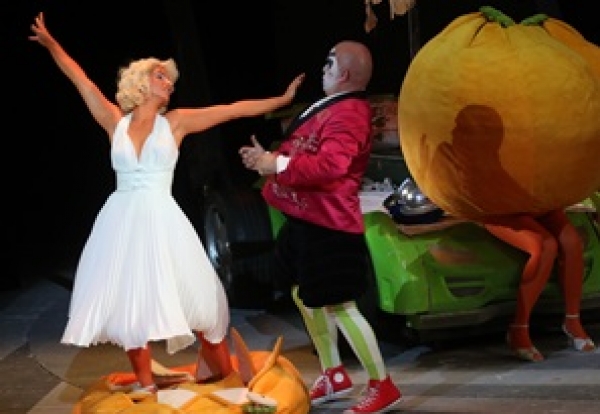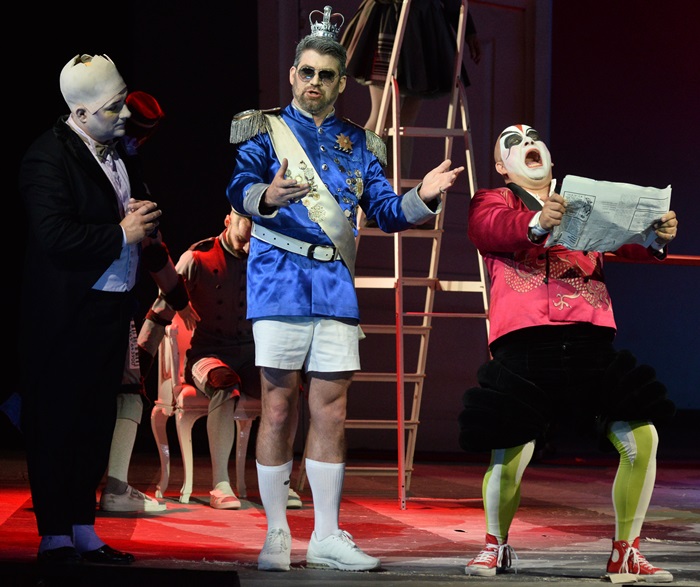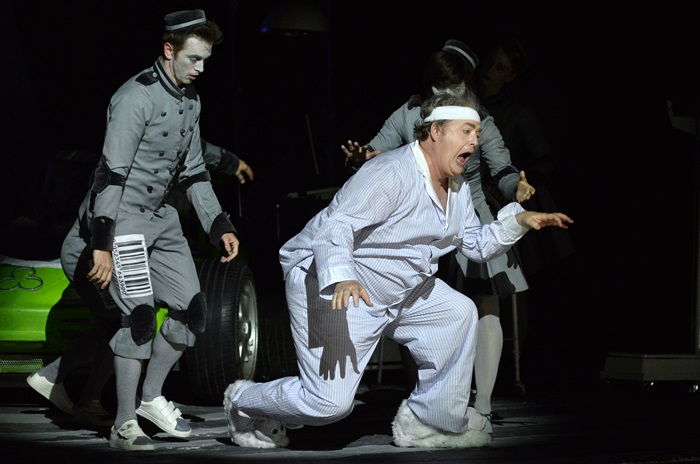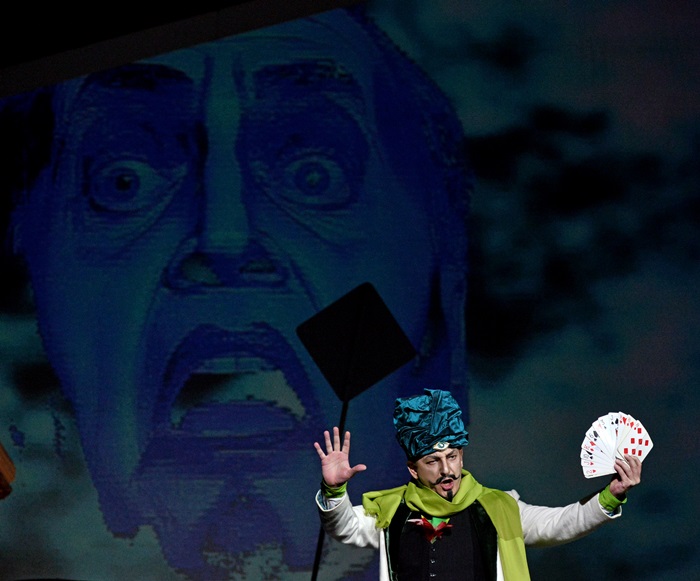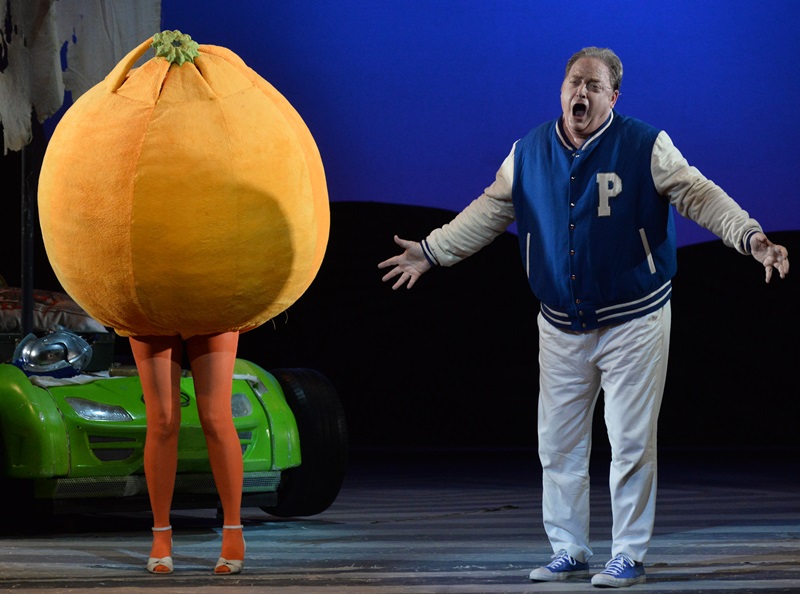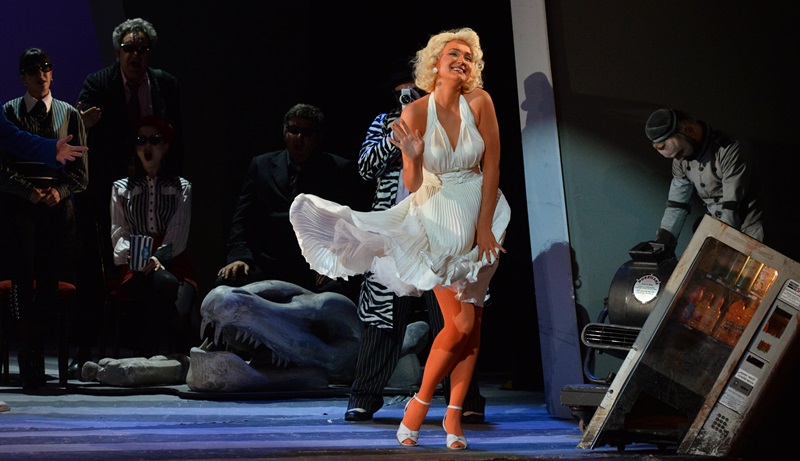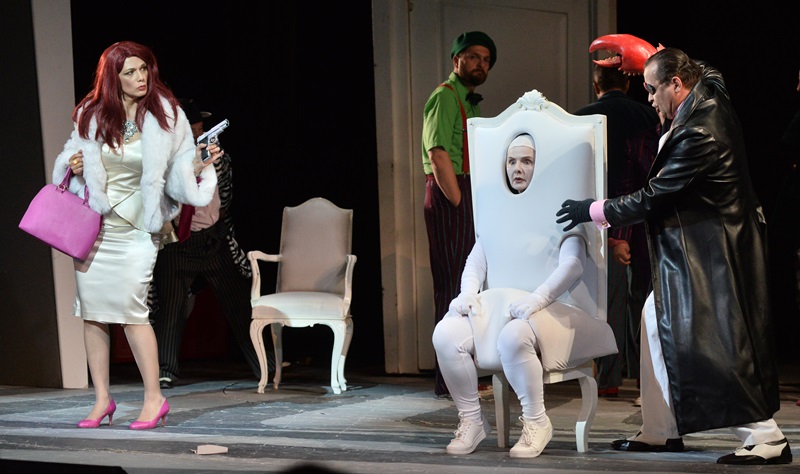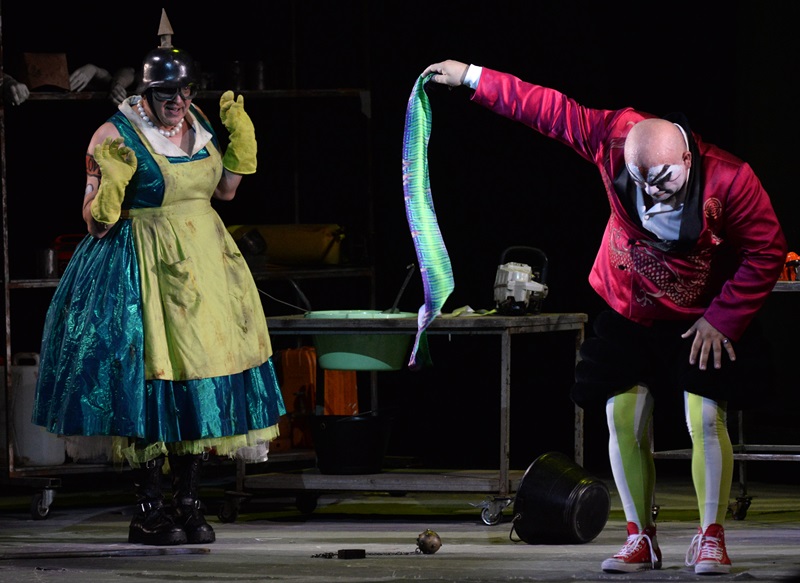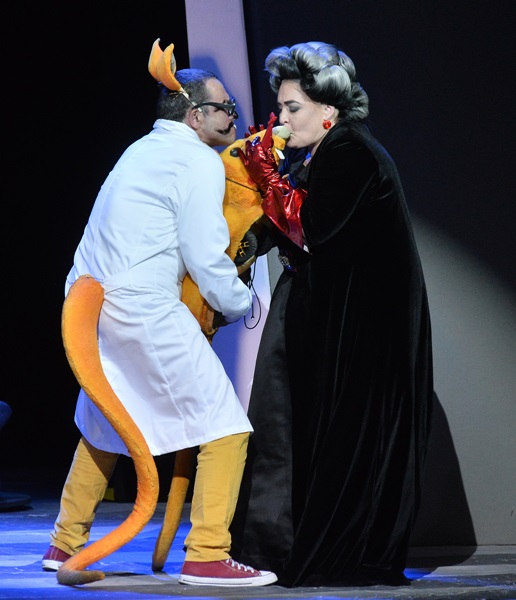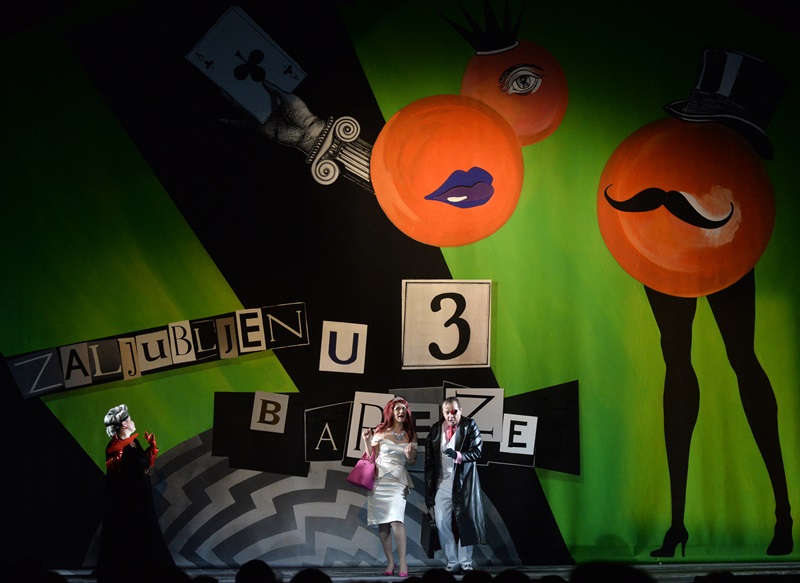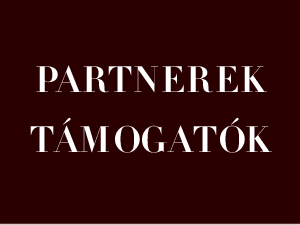Prokofiev’s rarely performed opera, The love for three oranges (L’Amour des Trois Oranges) was presented on 13 June at the Bartók Plus Opera Festival in Miskolc, Hungary. It was a guest performance of the Zagreb National Theatre.
Is it worth writing an opera about someone who falls in love with three oranges? Yes, if the author’s name is Sergei Prokofiev. The work is based on the tale of the 18th-century writer Carlo Gozzi. His name not only became part of the opera history because of Prokofiev's work. The title of his other tale is called Turandot. However, while Puccini wrote a serious opera from that story, with which he conquered the world, Prokofiev's opera, The love for three oranges – which is far more faithful to the spirit of Gozzi's comedies – became less known. The more important it was to see it now on such a high level. In the performance of the Zagreb company, the extravagant masterpiece of the great Russian composer, inspired by the traditions of commedia dell'arte, was staged as a magnificent show.
The love for three oranges is a fantastic fairy tale, a monumental musical joke, an absurd comedy with a satirical tone, that wants nothing else than to entertain. The stage director of this performance, Krešimir Dolenčić was right, that he did not want to understand and make us understood the deeper meaning of the work (for there is no such thing in it), but only to fascinate the audience and make them laugh. (However, we should note, that this opera[-parody] is often interpreted as Prokofiev’s ironic answer to Stanislavsky's realistic theatre and the ever-popular theatrical works of Puccini.) Prokofiev ’only’ entertains, but does it brilliantly, in a musically highly demanding and sophisticated work.
The libretto was originally written in Russian, but the work was finally presented in French in Chicago in 1921. Now we heard it in Croatian.
According to the bizarre story, the son of the King of Clubs, the Prince is depressed. Someone should make him laugh, but no one succeeds, not even the court jester. The Prince, however, unexpectedly begins to laugh when he sees the knickers of the evil witch Fata Morgana tumbling on the ground. The witch puts a strange love curse on him, and the Prince becomes obsessed with three oranges from that day. He takes the road, and with the help of the jester, they get the three oranges from the man-eater Cook. All three fruits hide a girl. The first two die of thirst in the desert, but the girl stepping out of the third orange, Ninetta is saved. The lovers will be together, and the villains will receive their deserved punishment.
By the ’play-within-the-play’ dramaturgical solution the ’spectators’ quarrelling with each other, have a particular role in the opera: one group is the advocate of tragedy, the other appraises comedy, while the third wants to see romance and pathos on the stage. In this performance, they took their seats in the first row of the auditorium and in some boxes upstairs, always making comments on the stage events. Ten of them, called the Eccentrics, even intervenes in the plot. Thanks to this strange company, the Princess, who comes out of the third orange, does not share the fate of her sisters. She gets a refreshment from the fridge found by the Eccentrics in the desert. They hunt down Fata Morgana, the witch, and lock her up.
On the stage, we see a vivid, chaotic carnival bustle. Doctors, soldiers, demons, angels, dancers and acrobats come and go, bounce and fly in garish, colourful costumes; there is never a dull moment. As a climax of this pooling of ideas, all three beautiful girls emerging from the oranges look like Marilyn Monroe. Another strength of this creative, exciting production is the skilful use of video technology and the imposing light show.
Tenor Michael Robert Hendrick formed the hypochondriac, wailing, then lover hero Prince vigorously, with devotion, clowning very well.
Ladislav Vrgoč was also excellent in the role of the desperate, always flopping court jester, Truffaldino.
Tanja Ruždjak played charmingly the naïve, vulnerable Ninetta, the symbol of innocence, who comes out of the third orange. (This is probably the shortest heroine role in the history of opera, and certainly the only work in which the heroine changes into a rat. Because, thanks to the intrigues of Fata Morgana, this also happens. Later, in the last moments before the wedding, she transforms back, of course. She cannot get rid of the rat's ears and its tail, but the Prince, who is madly in love, gets over it fast.)
Siniša Štork played the funny character of the ferocious cannibal, the Cook, who kills his victims with a ladle. The bass singer was dressed up as an old woman, wearing a war helmet. (Truffaldino gives him a beautiful ribbon, and beautiful ribbons are the chef’s weakness. He immediately softens, so the Prince and the Jester succeed in stealing the three oranges from him.)
We saw a characteristic acting by Sofia Ameli Gojić, forming Princess Clarissa, the King’s malicious niece.
Davor Radić who played the role of Leandro, the obsequious Prime Minister, and Berislav Puškarić who turned the rather ball-less King of Clubs in his shorts, white knee socks and a general’s uniform, were also good.
Just like Tamara Franetović Felbinger, the vile and evil Fata Morgana. Hearing her demonic, mocking laugh even the soldiers’ blood ran cold.
I do not mention the other singers by name. There are a total of sixteen solo roles in the play. Neither of them is very easy to sing, no matter how short it is. In The love for three oranges, above all, good character singers are needed with adequate acting and comedic skills. In the present production, we saw such singers without exception. Prokofiev's inventive music is accompanied by an imaginative orchestration. The musical characterization is marvellous. Thanks to the vigorous conducting of Nikša Bareza, the musical implementation was worthy of the Russian composer's work. The orchestra, producing a balanced sound, played vividly and energetically. The fast tempi and the unexpected rhythm changes were always played precisely. A particular merit of the conductor was that the sound of the orchestra never drowned out the voices, not even in the most powerful musical parts.
One reason why Prokofiev's opera never became really popular may be that there are no closed numbers in the piece. No arias or duets, which could be performed in concerts, too. Prokofiev, however, later wrote a short orchestral suite from the opera's music, one movement of which called March became a popular concert piece. This opera performance ended with March, as after the finale the characters came out to bow to this music. Just to surprise the audience once more, for the last time this evening.
Balázs Csák
photo: Vera Éder
***
Bartók Plus Opera Festival
Sergei Prokofiev:
Opera with a Prologue, in four acts, in two parts, in Croatian language
The libretto by Prokofiev is was based on the Italian play L'amore delle tre melarance by Carlo Gozzi.
Light: Elvis Butković
Video effects: Willem Miličević
Set and Costume Design: Simon Beyer
Conductor: Nikša Bareza
Directed by: Krešimir Dolenčić
Cast:
Prince: Michael Robert Hendrick
Princess Clarissa: Sofia Ameli Gojić
Leandro: Davor Radić
Truffaldino: Ladislav Vrgoč
Pantaloon: Ljubomir Puškarić
Chelio: Ozren Bilušić
Fata Morgana: Tamara Franetović Felbinger
Princess Ninetta: Tanja Ruždjak
Princess Linetta: Sonja Runje
Princess Nicoletta: Iva Krušić
Smeraldina: Cecilija Car
Farfarello: Vitomir Marof
Cook: Siniša Štork
Master of Ceremonies: Božimir Lovrić
Herald: Ivica Trubić
Bass trombone: Mate Đuzel
Magician: Leonardo Krakić (Mak teatar)
Eccentrics: Kristijan Beluhan, Tomica Blažina, Mario Bokun, Siniša Galović, Ivo Gamulin, Željko Grofelnik, Igor Hapač, Saša Ivaci, Damir Klačar i Alen Ruško
Dancers (Dance CenterTala): Luka Anaković, Iva Čevizović, Andrea Hršak, Kristijan Mihalić, Mirna Gaberšnik, Ivana Topolovac, Karlo Topolovec, Tomislav Žalec
Orchestra and Choir of the Croatian National Theatre of Zagreb


